The 15 best uses for Baking Soda in your garden.
Ryan Aliapoulios from Home Hacks has put together some fascinating information on the benefits of baking soda in your garden. Why not try them out, and if you do, let us know how you think they worked. We'd love some feedback. Just use the CONTACT US form.
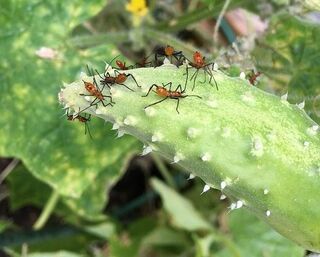
1. It can be used as a pesticide.
For those of us who are thrifty (or environmentally conscious), buying chemical pesticides is a pretty undesirable option. Although we don’t want our gardens to get eaten up by bugs and other critters, we also don’t want to risk having poison leak into the ground or get carried into our home. Fortunately, you can make a safe and effective pesticide with baking soda! All you have to do is mix a tablespoon of olive oil, two tablespoons of baking soda and a couple drops of liquid soap in a gallon of water. Put it in a spray container and apply gently to your garden every three days—it will definitely keep the bugs away!
For those of us who are thrifty (or environmentally conscious), buying chemical pesticides is a pretty undesirable option. Although we don’t want our gardens to get eaten up by bugs and other critters, we also don’t want to risk having poison leak into the ground or get carried into our home. Fortunately, you can make a safe and effective pesticide with baking soda! All you have to do is mix a tablespoon of olive oil, two tablespoons of baking soda and a couple drops of liquid soap in a gallon of water. Put it in a spray container and apply gently to your garden every three days—it will definitely keep the bugs away!
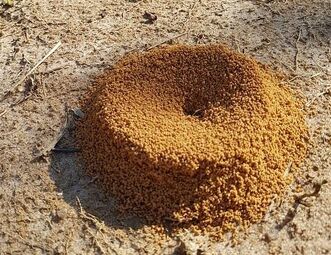
2. Stop ants at the source
Similarly, you can target ants specifically if you use a mixture of five teaspoons of baking soda, five teaspoons of confectioners sugar and a teaspoon of water. The ants will be attracted to the sugar and eat it, though the baking soda they’ll eat with it will be fatal. Pour your mixture on any anthills you might find and add a little bit of vinegar. The last step will be sure to get any surviving ants.
Similarly, you can target ants specifically if you use a mixture of five teaspoons of baking soda, five teaspoons of confectioners sugar and a teaspoon of water. The ants will be attracted to the sugar and eat it, though the baking soda they’ll eat with it will be fatal. Pour your mixture on any anthills you might find and add a little bit of vinegar. The last step will be sure to get any surviving ants.
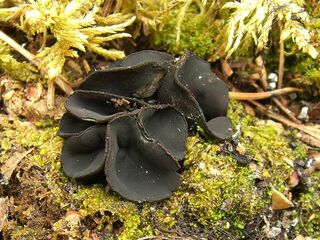
3. Try it out as a fungicide.
If your garden or the general climate near your home is particularly damp, your gardens may start to grow unwanted fungi that can be tricky to get rid of. Fortunately, baking soda provides an easy solution! All you have to do is mix four teaspoons of baking soda into a gallon of water. Use the mix to water the problem areas in the garden—it’s particularly helpful for spot fungus on roses.
If your garden or the general climate near your home is particularly damp, your gardens may start to grow unwanted fungi that can be tricky to get rid of. Fortunately, baking soda provides an easy solution! All you have to do is mix four teaspoons of baking soda into a gallon of water. Use the mix to water the problem areas in the garden—it’s particularly helpful for spot fungus on roses.
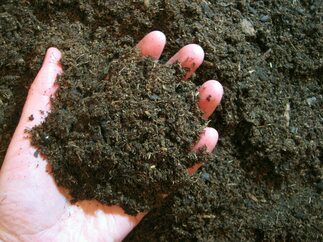
4. Use it to check the pH of your garden soil.
Rather than buying a pH kit specifically, you can use baking soda to get a general read of how acidic or alkaline your soil is. To do this experiment, get two samples of soil in different containers from your garden. On the side, have a half cup of vinegar and a half cup of baking soda ready. Next, pour your vinegar into one of the samples and see if it bubbles. If it does, your soil is above pH 7, meaning it’s alkaline! If it doesn’t react, take your other sample and add in your baking soda along with half a cup of water. If that one bubbles, your soil is below pH 7, or somewhat acidic.
Rather than buying a pH kit specifically, you can use baking soda to get a general read of how acidic or alkaline your soil is. To do this experiment, get two samples of soil in different containers from your garden. On the side, have a half cup of vinegar and a half cup of baking soda ready. Next, pour your vinegar into one of the samples and see if it bubbles. If it does, your soil is above pH 7, meaning it’s alkaline! If it doesn’t react, take your other sample and add in your baking soda along with half a cup of water. If that one bubbles, your soil is below pH 7, or somewhat acidic.
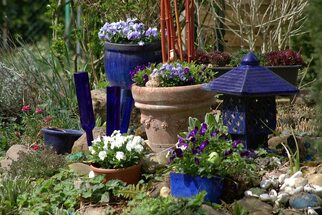
5. Use it to clean your garden decorations.
Just as you use it inside your house, baking soda does wonders to clean whatever trinkets and decorations you may have sitting in your garden—and it won’t harm the local wildlife, either! Just sprinkle it onto whatever surface you want to clean and wash it off with a damp cloth. Your decorations should be good as new!
Just as you use it inside your house, baking soda does wonders to clean whatever trinkets and decorations you may have sitting in your garden—and it won’t harm the local wildlife, either! Just sprinkle it onto whatever surface you want to clean and wash it off with a damp cloth. Your decorations should be good as new!
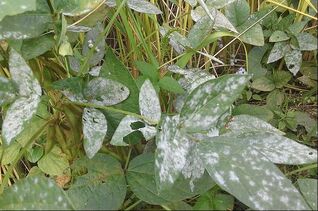
6. Apply it to your plants to get rid of mildew.
Just like the tip about fungus, baking soda can also kill off mildew that can rot your plants (fruits and vegetables in particular). All you have to do is mix a tablespoon of baking soda with two and a half tablespoons of horticultural oil in a gallon of water. Put it in a bottle and spray it on your plants to give them a protective layer against mildew.
Just like the tip about fungus, baking soda can also kill off mildew that can rot your plants (fruits and vegetables in particular). All you have to do is mix a tablespoon of baking soda with two and a half tablespoons of horticultural oil in a gallon of water. Put it in a bottle and spray it on your plants to give them a protective layer against mildew.
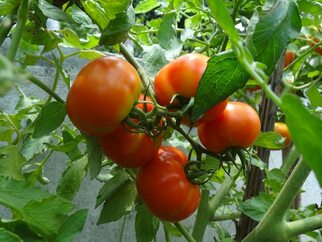
7. Make your tomatoes a little sweeter with it.
Tomatoes become sweeter when they grow in soil that is less acidic—so why not give it a try? All you have to do is sprinkle baking soda lightly onto the soil they’re growing in and let it absorb naturally. When they’re finally ready to eat, they should have a sweeter and more tart flavor than you may be used to!
Tomatoes become sweeter when they grow in soil that is less acidic—so why not give it a try? All you have to do is sprinkle baking soda lightly onto the soil they’re growing in and let it absorb naturally. When they’re finally ready to eat, they should have a sweeter and more tart flavor than you may be used to!

8. Use it to make your bouquets last a little longer.
It’s great to bring flowers inside the home for decoration but they always seem to wilt sooner than we’d like. To fight back, try throwing a pinch of salt and a pinch of baking soda into a vase along with water for the flowers. With any luck, the combination should extend their life at least for a while.
It’s great to bring flowers inside the home for decoration but they always seem to wilt sooner than we’d like. To fight back, try throwing a pinch of salt and a pinch of baking soda into a vase along with water for the flowers. With any luck, the combination should extend their life at least for a while.
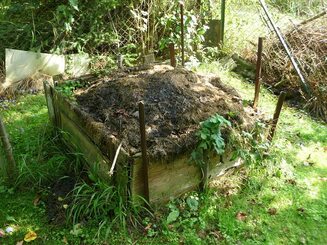
9. Put it on compost to make it a little less smelly.
Some of us have gotten into composting as a way to be more sustainable and good to the environment. Still, the process produces some unbelievably bad smells. Fortunately, there’s an easy fix for this. All you have to do is add a little bit of baking soda on top to absorb some of the odor and fix the acidity a little. Don’t do too much, though, or you’ll slow the decomposition process entirely!
Some of us have gotten into composting as a way to be more sustainable and good to the environment. Still, the process produces some unbelievably bad smells. Fortunately, there’s an easy fix for this. All you have to do is add a little bit of baking soda on top to absorb some of the odor and fix the acidity a little. Don’t do too much, though, or you’ll slow the decomposition process entirely!
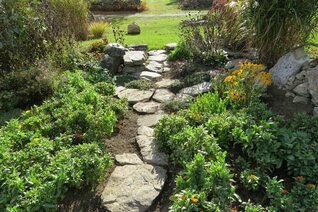
10. Brighten up your garden walkways with it!
The winding paths we have through our gardens are often beautiful and relaxing to walk through… until they start getting grimy and covered in weeds. Once again, baking soda can help! Try washing their surfaces with two tablespoons of baking soda and a quart of warm water (use these proportions for however much solution you make). Add a little more baking soda for tougher stains. After that, dip a brush in and scrub away! Be careful not to spill the solution in any delicate garden beds, though.
The winding paths we have through our gardens are often beautiful and relaxing to walk through… until they start getting grimy and covered in weeds. Once again, baking soda can help! Try washing their surfaces with two tablespoons of baking soda and a quart of warm water (use these proportions for however much solution you make). Add a little more baking soda for tougher stains. After that, dip a brush in and scrub away! Be careful not to spill the solution in any delicate garden beds, though.
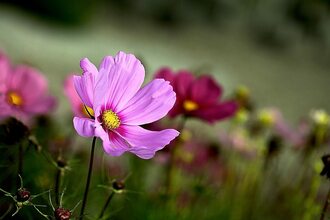
11. Make your flowers bloom even brighter.
Just like with the tomatoes we mentioned earlier, certain flowers thrive in alkaline soil. To push the soil that way, try mixing a little baking soda into their watering can before you let them drink. When they finally bloom, they should be brighter and healthier than they would’ve been otherwise!
Just like with the tomatoes we mentioned earlier, certain flowers thrive in alkaline soil. To push the soil that way, try mixing a little baking soda into their watering can before you let them drink. When they finally bloom, they should be brighter and healthier than they would’ve been otherwise!
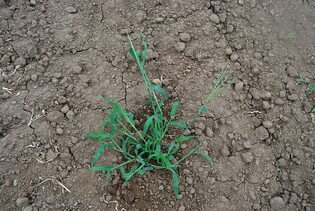
12. Use it to kill off any annoying patches of crabgrass.
If you don’t already know, crabgrass are those annoying and fibrous little chunks of grass that seem to always grow back between sidewalks and other problem areas. For an easy way to get rid of them so they won’t come back, all you have to do is moisten the problem area and apply a thick amount of baking soda so it turns into a paste. Sweep the paste into any cracks and it should wipe out any weeds you may have—just keep it away from the grass you want!
If you don’t already know, crabgrass are those annoying and fibrous little chunks of grass that seem to always grow back between sidewalks and other problem areas. For an easy way to get rid of them so they won’t come back, all you have to do is moisten the problem area and apply a thick amount of baking soda so it turns into a paste. Sweep the paste into any cracks and it should wipe out any weeds you may have—just keep it away from the grass you want!
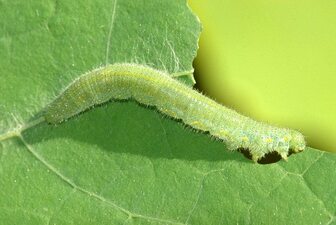
13. Stop cabbage worms in their tracks.
Even if you don’t grow cabbages specifically, cabbage worms can really wreak havoc on any well-meaning garden. Fortunately, there’s an easy solution. Mix an equal amount of flour and baking soda and use the mixture to dust whatever produce you may be growing. Though the worms will still try to eat the plants, the mixture will kill them off when they do!
Even if you don’t grow cabbages specifically, cabbage worms can really wreak havoc on any well-meaning garden. Fortunately, there’s an easy solution. Mix an equal amount of flour and baking soda and use the mixture to dust whatever produce you may be growing. Though the worms will still try to eat the plants, the mixture will kill them off when they do!
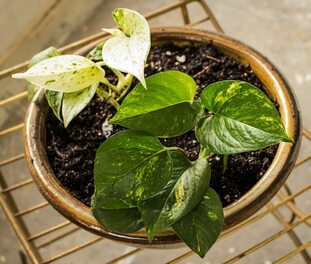
14. Use it to wipe down your houseplants!
If you have any big plants inside that gather dust or grime, it can be hard to effectively clean them since you can’t use the usual chemicals. To shine them up a little without hurting them, just use a little bit of baking soda and warm water and wipe them gently. They should be good as new!
If you have any big plants inside that gather dust or grime, it can be hard to effectively clean them since you can’t use the usual chemicals. To shine them up a little without hurting them, just use a little bit of baking soda and warm water and wipe them gently. They should be good as new!

15. Finally, put it all over your hands after a long day of working in the garden!
Although gardening can be both relaxing and rewarding, a full day of it can lead to some very dirty hands that are hard to get clean. Once again, baking soda can come to the rescue here! All you have to do is wet your hands and get them coated in the baking soda. Use a nail brush for the particularly hard spots and you should be good to go!
Although gardening can be both relaxing and rewarding, a full day of it can lead to some very dirty hands that are hard to get clean. Once again, baking soda can come to the rescue here! All you have to do is wet your hands and get them coated in the baking soda. Use a nail brush for the particularly hard spots and you should be good to go!
